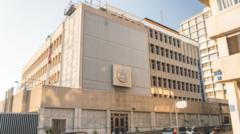The recent arrest of Paul Chambers, an American lecturer in civil-military relations in Thailand, has ignited significant concern from U.S. officials, highlighting the stringent nature of the country's lèse-majesté laws that prohibit criticism of the monarchy.
American Scholar Detained in Thailand Over Criticizing Monarchy

American Scholar Detained in Thailand Over Criticizing Monarchy
U.S. State Department expresses concern over the arrest of Paul Chambers, an American academic, under Thailand's controversial lèse-majesté laws.
The arrest took place in Phitsanulok, Thailand, where Chambers teaches at Naresuan University. According to statements from the U.S. State Department, he faces serious charges under both the lèse-majesté statute and the Computer Crimes Act. Tammy Bruce, a spokesperson for the State Department, confirmed that dialogues with Thai authorities regarding his situation are currently underway.
Lèse-majesté laws in Thailand rank among the strictest globally, severely penalizing any act deemed as defamation, insult, or threat towards the monarchy. The repercussions of these laws bear significant weight, with sentences ranging from three to fifteen years in prison for violations. Human rights organizations have openly condemned these laws, asserting that they suffocate free speech within the country. Though instances of lèse-majesté convictions occur frequently, it is particularly rare for a foreign national to face such charges.
"This incident underscores our ongoing concerns regarding the enforcement of lèse-majesté laws," Ms. Bruce stated, calling on Thailand to uphold freedoms of expression while ensuring that legal statutes are not employed to suppress lawful discourse. Following the arrest, consular officers from the U.S. Embassy in Bangkok have sought to make contact with Chambers to assess his situation. The State Department emphasized its commitment to advocating for his fair treatment, underscoring the importance of the U.S.-Thailand alliance.
As global scrutiny mounts on this case, it remains to be seen how Thai courts will handle Chambers' case amidst an array of similar lèse-majesté charges pending resolution this year.
Lèse-majesté laws in Thailand rank among the strictest globally, severely penalizing any act deemed as defamation, insult, or threat towards the monarchy. The repercussions of these laws bear significant weight, with sentences ranging from three to fifteen years in prison for violations. Human rights organizations have openly condemned these laws, asserting that they suffocate free speech within the country. Though instances of lèse-majesté convictions occur frequently, it is particularly rare for a foreign national to face such charges.
"This incident underscores our ongoing concerns regarding the enforcement of lèse-majesté laws," Ms. Bruce stated, calling on Thailand to uphold freedoms of expression while ensuring that legal statutes are not employed to suppress lawful discourse. Following the arrest, consular officers from the U.S. Embassy in Bangkok have sought to make contact with Chambers to assess his situation. The State Department emphasized its commitment to advocating for his fair treatment, underscoring the importance of the U.S.-Thailand alliance.
As global scrutiny mounts on this case, it remains to be seen how Thai courts will handle Chambers' case amidst an array of similar lèse-majesté charges pending resolution this year.






















